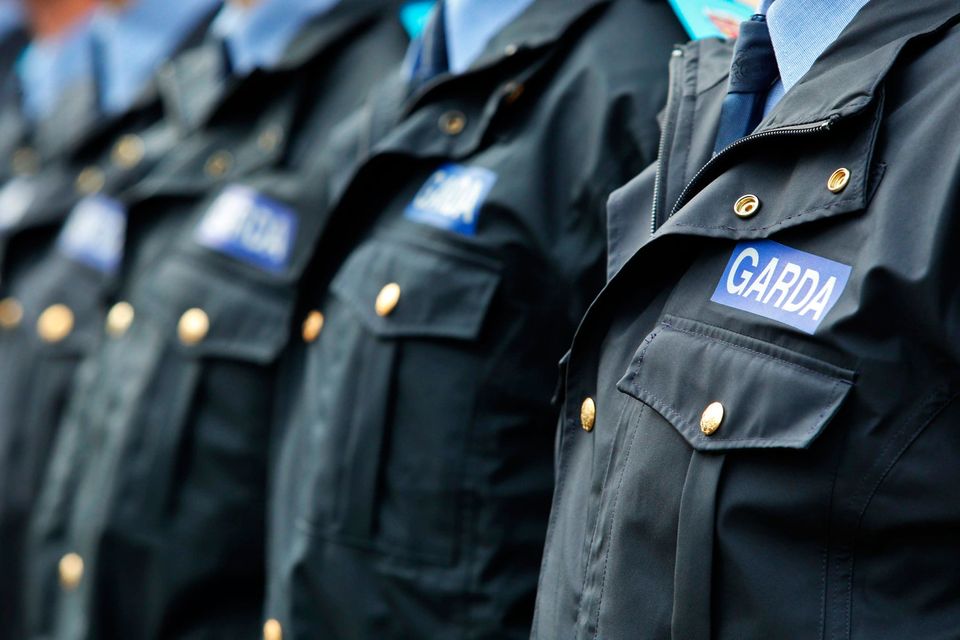Martina Devlin: Trust in the Garda damaged by even the hint of a strike - and it will never be regained
Trainee gardai look on during a Scott Medal and Commendation presentation Ceremony in Templemore Photo: Colin Keegan, Collins Dublin
Once the Rubicon is crossed there is no going back. Beyond that river lies the point of no return.
Currently, rank-and-file gardaí are standing knee-deep in the Rubicon, wading towards conflict - and a different relationship with the public they serve.
But there is time to turn back still. The decision is not irrevocable.
Gardaí have signalled their intention to break the law they are sworn to uphold, a contradiction which cannot be explained away. Workplace grievances do not excuse such a radical step, nor does frustration with the negotiating process.
If they go on strike on November 4, as threatened, a revolutionary choice will be made. Even the declaration of industrial action is unprecedented, let alone following through on it.
Gardaí are barred legally from striking. They have never done so in the history of the State, although dissatisfaction with pay and conditions has seethed in the past. Striking is not an unusual weapon in industrial relations negotiations and disputes. But in Garda terms it is extreme.
They may well feel goaded into it - no one makes war with a light heart. Yet they are steering now towards a fight. Win or lose, keep going or reconsider, a casualty has emerged already.
Public trust is shaken.
A strike risks causing permanent damage to the reputation of the force. An Garda Síochána enjoys the support of the overwhelming majority of the Irish people, who recognise that its members play a challenging and essential role in defending the law.
Confidence in the gardaí is wobbling at news of a "unilateral withdrawal of services" for four days spaced out through November. Inevitably, if even one of the strikes takes place, the public will never see the gardaí in quite the same light again.
Something important will be set aside. The bargain between citizen and guard will be weakened.
Does that matter to the men and women who feel disillusioned, resentful and wronged enough to vote by a 95pc majority to strike? Perhaps not today, in the heat of grievance. But it should. Trust, once lost, is not easily regained.
When Julius Caesar crossed the river Rubicon in 49BC it was an act of insurrection. Battle was inevitable because generals were ordered to disband their legions before entering Italy - the Rubicon, at that time, formed the boundary between Gaul and Italy. "The die has been cast," the Roman historian Suetonius quotes him.
Caesar proved to be the victor, and consequently was never penalised for law-breaking. The moral: do something illegal, and if you win it's no longer illegal.
But the gardaí have embarked on a perilous journey. To win, but lose public support in the process, is a high price. One which no democratic State can afford.
If it was legal for gardaí to strike, it would give them the ultimate weapon to level against those with whom they negotiate - the Department of Justice, on behalf of citizens. Communities rely on the guards to maintain law and order, after all.
That weapon has now been cocked, despite legislation exposing Garda Representative Association members to criminal proceedings.
I cannot believe it is a decision that was reached without serious reflection. So what drives them onwards across their Rubicon?
Everything in life is interconnected. Perhaps the housing crisis is a factor - the human desire for a roof. That need is undermined by the combination of high rents, and the 20pc deposit requirement for a residential mortgage. (The deposit is 10pc for first time buyers up to and including €220,000 - but that's of no use to anyone buying in the capital.)
Gardaí, nurses and teachers form a key load-bearing pillar of society. Gardaí, in particular, are exposed to the seamier side of life, and a decent standard of living in return for a decent job of work shouldn't be too much to ask.
But many public sector workers can't afford to live in Dublin although the jobs are there, largely. Dublin rents are presently 3.9pc higher than the previous peak of 2009, while private rents rose nearly 10pc across the country from April to June 2016, compared with the same period last year, according to ESRI research.
While the Garda dispute is about more than pay, there is no doubt that younger recruits are caught in a vicious circle where their wages are gobbled up by rents - meanwhile they can't afford to save for a house deposit. "That's the thanks we get after years of austerity," is a common complaint. And it's understandable.
Equally, public funds must be used prudently and it's worrying to see fiscal restraint unravel. The domino effect will have widespread repercussions. Surely efficiencies should be offered in tandem with the now familiar demand for pre-collapse pay reinstatement.
Garda representatives could do more to spread the message of how dangerous the job is and how limited the supports. Strike action positions them on boggy ground, when they could easily occupy the high ground.
They need a clear voice outlining their concerns. For example, they could release details of injuries sustained in the line of duty, and list some of the derisory sentences handed down by courts after they have laboured for convictions.
Some gardaí encounter criminal gangs in the course of duty. This can put their families at risk. Are there sufficient supports to deal with such frightening circumstances? Anecdotal evidence suggests otherwise.
The 'Blue Flu' of 1998, when more than two-thirds of Dublin gardaí and up to 100pc in some country areas phoned in sick simultaneously, caused widespread public alarm - the Dáil held an emergency debate.
What's proposed on November 4 is more drastic than any apparent sickness epidemic. No doubt, emergency measures will be put in place and the Army can plug some of the gaps. But such substitutes can never be more than a finger-in-the-dyke exercise.
It's back to trust again. We must trust that the mechanisms to resolve this dispute are toiling away. Something has been lost, however - the gardaí's authority has been dented.
They took a decision calculated to hurt the State they serve. Whatever their reasons, that was a bad day's work.
Join the Irish Independent WhatsApp channel
Stay up to date with all the latest news















